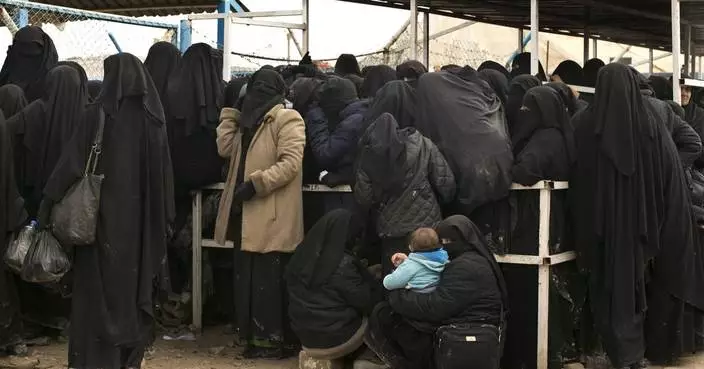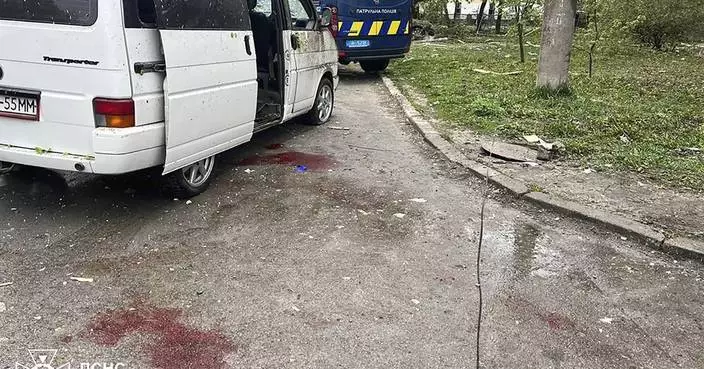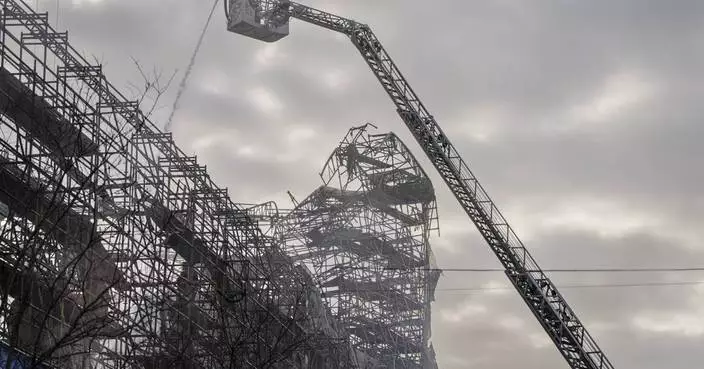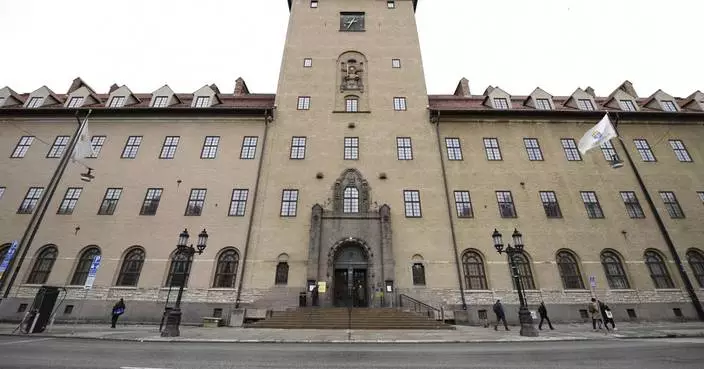It was not an explosion that woke us up, but a call from a friend in Damascus to alert us: The strikes had begun. It was just after 4 a.m. Saturday. I rushed out of my hotel room up to The Associated Press' office a few floors above.
By the time I got there, anti-aircraft guns were at work, their tracers dotting the night sky over the Syrian capital. Our office, facing east, provided an almost theatrical view. To the left was the mountain overlooking Damascus from which Syrian air defenses were firing. Straight in front of us was the orange glow from fires on the city outskirts where the airstrikes carried out by the United States, Britain and France had hit.
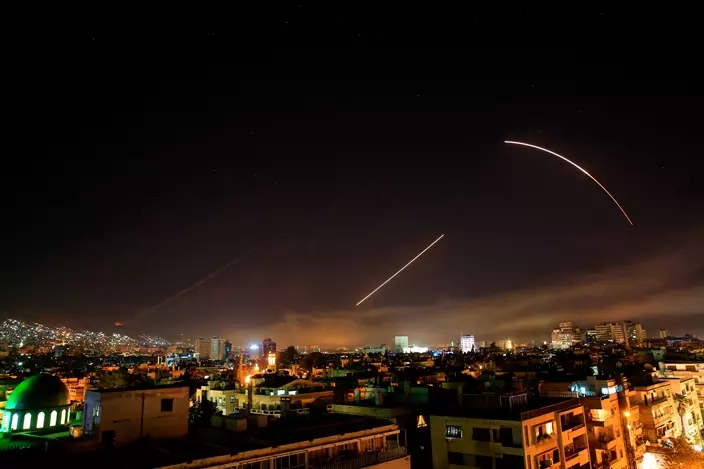
FILE - In this Saturday, April 14, 2018 file photo, missiles streak across the Damascus skyline as the U.S. launches an attack on Syria targeting different parts of the capital. (AP Photo/Hassan Ammar, File)
I was already all set up. Days earlier, I had put my camera in place on its tripod out on the balcony, hooked to a remote control so I could operate it from inside.
The surface-to-air missiles began to fire. This was the shot I had planned for. My first picture was no good — it was out of the frame. But the second captured the moment: The streak of the missile, drawn out in the long exposure, lanced up into the night, another one further behind it.
The AP team had arrived in Damascus from Beirut earlier in the week. We were far from the only spectators in those pre-dawn hours.
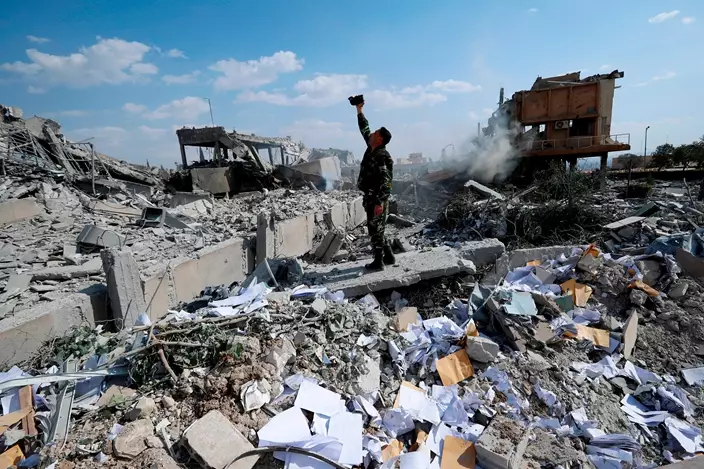
FILE - In this Saturday, April 14, 2018 file photo, a Syrian soldier films the damage of the Syrian Scientific Research Center which was attacked by U.S., British and French military strikes to punish President Bashar Assad for suspected chemical attack against civilians, in Barzeh, near Damascus, Syria. (AP Photo/Hassan Ammar, File)
Many Damascus residents had spent the past nights on their rooftops watching for an attack. If they were fearful about where the standoff between Syria, Russia and the U.S. over an alleged chemical attack was going, few showed it. There was no sense of dread, and Damascus' main market, Souq al-Hamidiyya, was packed with thousands of people the day before the attack.
Hours after the strikes, officials took journalists to the Syrian Scientific Research Center on Damascus' eastern edge. The strikes had reduced the complex to smoldering rubble.
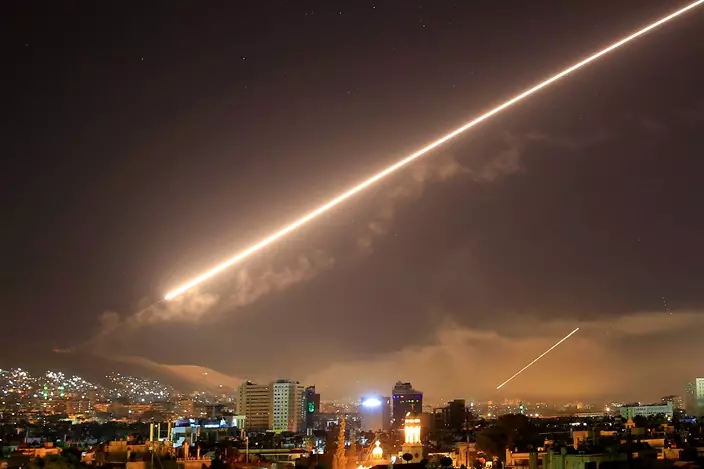
Damascus skies erupt with surface to air missile fire as the U.S. launches an attack on Syria targeting different parts of the Syrian capital Damascus, Syria, early Saturday, April 14, 2018. Syria's capital has been rocked by loud explosions that lit up the sky with heavy smoke as U.S. President Donald Trump announced airstrikes in retaliation for the country's alleged use of chemical weapons. (AP Photo/Hassan Ammar)
But the sense of defiance was in full force Saturday. Residents massed in the streets, waving Syrian flags and chanting in support of President Bashar Assad. In the eyes of government supporters, it seemed, the strikes had come and gone.
JERUSALEM (AP) — Israeli Prime Minister Benjamin Netanyahu said Wednesday his country would be the one to decide whether and how to respond to Iran’s major air assault earlier this week, brushing off calls for restraint from close allies.
Israel has vowed to respond to Iran’s unprecedented attack without saying when or how, leaving the region bracing for further escalation after months of unrest linked to the ongoing war in Gaza.
Israel’s allies have been urging Israel since the attack to hold back on any response that could spiral. These calls were repeated on Wednesday during visits by the British and German foreign ministers.
The diplomatic pressures came as Iran’s president warned that even the “tiniest” invasion of its territory would bring a “massive and harsh” response. Violence meanwhile surged on Wednesday between Israel and the Iran-backed Lebanese militant Hezbollah group, which fired a volley of rockets and drones on northern Israel. The attack wounded at least 14 Israeli soldiers, six seriously, the army said. The military said it struck Hezbollah targets deep inside Lebanon in response.
Speaking to a meeting of his Cabinet, Netanyahu said he met Wednesday with both visiting foreign ministers and thanked them for their countries’ support. But he said Israel would make the call on its own on how to respond despite “all sorts of suggestions and advice” coming from Israel’s allies, some of whom — including the United States, the United Kingdom and France — helped Israel repel Iran’s drone and missile assault.
“I want to be clear: we will make our decisions ourselves. The state of Israel will do whatever is necessary to defend itself,” Netanyahu said.
Despite the tough rhetoric, Israel appears unlikely to attack Iran directly without at least the support of its top ally, the U.S. But it could resort to more covert methods such as targeting senior Iranian commanders or Iran-backed groups in other countries, or launching a cyber attack.
It’s unclear how Iran would then respond, given the heightened tensions — any miscalculation by either side risks setting off a regional war.
President Joe Biden’s administration on Tuesday said it would place new sanctions on Iran and has worked to coordinate a global rebuke of the attack while urging all sides to de-escalate. U.S. officials said earlier this week that Biden told Netanyahu that Washington would not participate in any offensive action against Iran.
Over the weekend, Iran launched hundreds of missiles and drones at Israel in response to an apparent Israeli strike on Iran’s Embassy compound in Syria on April 1 that killed 12 people, including two Iranian generals.
Israel says it and its partners successfully intercepted nearly all the missiles and drones. A 7-year-old girl was wounded in the attack, which did not cause any deaths or major damage.
Israel and Iran have waged a shadow war for decades, but the strike over the weekend was the first direct Iranian military attack on Israel.
With tensions surging, Israel’s allies have reinforced a message of restraint. British Foreign Secretary David Cameron and German Foreign Minister Annalena Baerbock each appealed for calm while on separate visits to the region.
Cameron said “it’s clear the Israelis are making a decision to act” against Iran, but he hoped they would do so “in a way that is smart as well as tough and also does as little as possible to escalate this conflict.” He spoke after meeting with Israel’s President Isaac Herzog, whose office is mainly ceremonial.
Baerbock said Germany stands “in full solidarity with Israel” but called on it to exercise restraint.
“Everyone must now act prudently and responsibly. I’m not talking about giving in. I’m talking about prudent restraint, which is nothing less than strength,” she told reporters. “Because Israel has already shown strength with its defensive victory at the weekend.”
The ministers said they would push for further international sanctions on Iran.
Iran’s President Ebrahim Raisi warned Israel against any retaliation as he addressed an annual army parade, which had been relocated to a barracks from its usual route and was not carried live on state TV — possibly because of fears that it could be targeted.
In remarks carried by Iran’s official IRNA news agency, Raisi said the weekend attack was limited, and that if Iran had wanted to carry out a bigger attack, “nothing would remain from the Zionist regime.”
Regional tensions have soared since the Oct. 7 attack on southern Israel launched by Hamas and Islamic Jihad, Palestinian militant groups supported by Iran. The attack killed some 1,200 Israelis, and the militants took around 250 hostages. Israel responded with one of the deadliest and most destructive military onslaughts in recent history, killing nearly 34,000 Palestinians, according to Gaza health officials, who do not distinguish between combatants and civilians in their count but say most of the dead are women and children.
Israel has withdrawn most of its forces from Gaza after major offensives that left its two biggest cities — Gaza City and Khan Younis — in ruins. But Israeli officials say the war is not over and that they plan to send ground forces into the southernmost Gaza city of Rafah, where more than half the territory’s population of 2.3 million people have sought refuge from fighting elsewhere.
Hamas is still holding around 130 hostages, a quarter of whom are believed to be dead, and international efforts to broker a cease-fire and hostage release have made little progress.
Hezbollah, another close Iran ally, has traded fire with Israel along the border on a near-daily basis since the war began, in a low-intensity conflict that risks igniting all-out war. Iran-backed groups in Iraq and Syria have also launched attacks, and the Iran-backed Houthi rebels in Yemen have targeted international shipping in the Red Sea, portraying it as a blockade of Israel.
Associated Press writers Nasser Karimi in Tehran, Iran; Jill Lawless in London and Kirsten Grieshaber in Berlin contributed to this report.
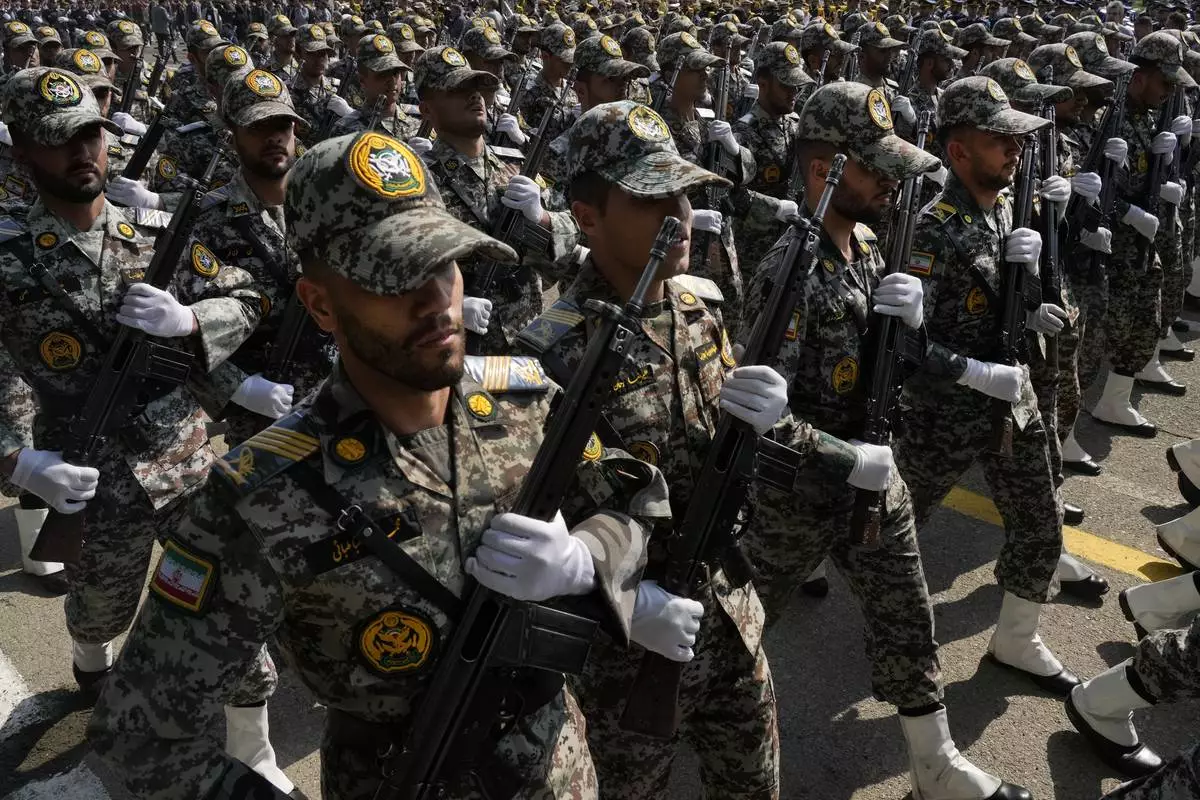
Iranian army members march during Army Day parade at a military base in northern Tehran, Iran, Wednesday, April 17, 2024. In the parade, President Ebrahim Raisi warned that the "tiniest invasion" by Israel would bring a "massive and harsh" response, as the region braces for potential Israeli retaliation after Iran's attack over the weekend. (AP Photo/Vahid Salemi)
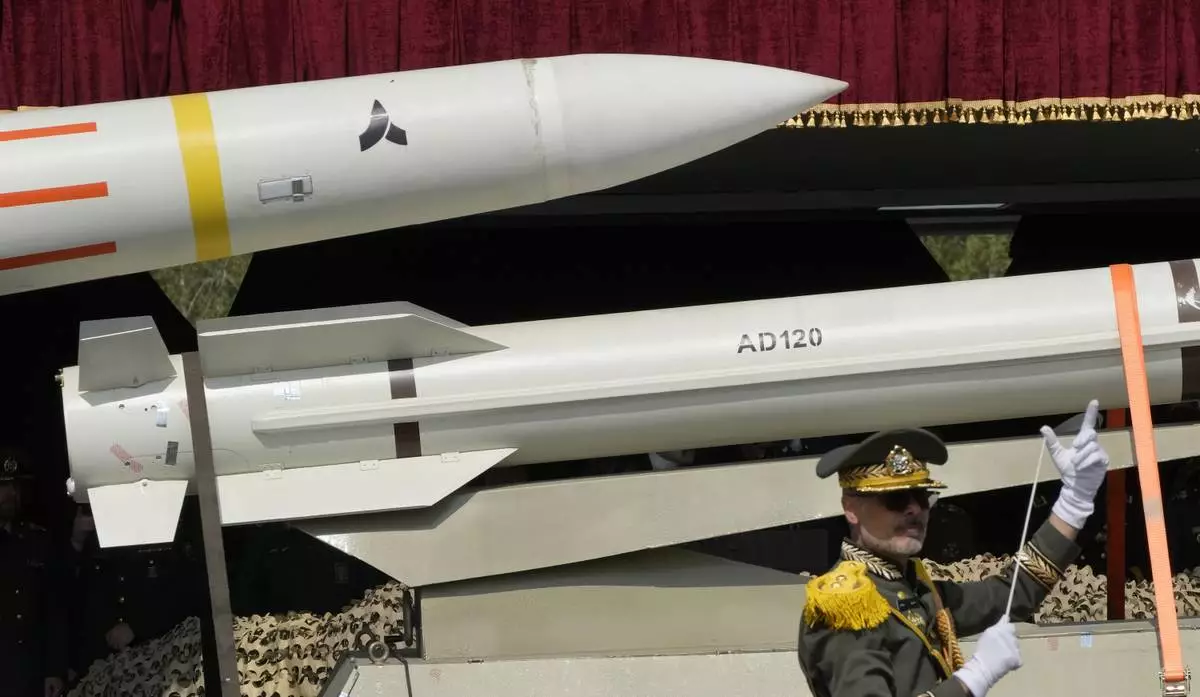
Missiles are carried on a truck as an Iranian army band leader conducts the music band during Army Day parade at a military base in northern Tehran, Iran, Wednesday, April 17, 2024. In the parade, President Ebrahim Raisi warned that the "tiniest invasion" by Israel would bring a "massive and harsh" response, as the region braces for potential Israeli retaliation after Iran's attack over the weekend. (AP Photo/Vahid Salemi)
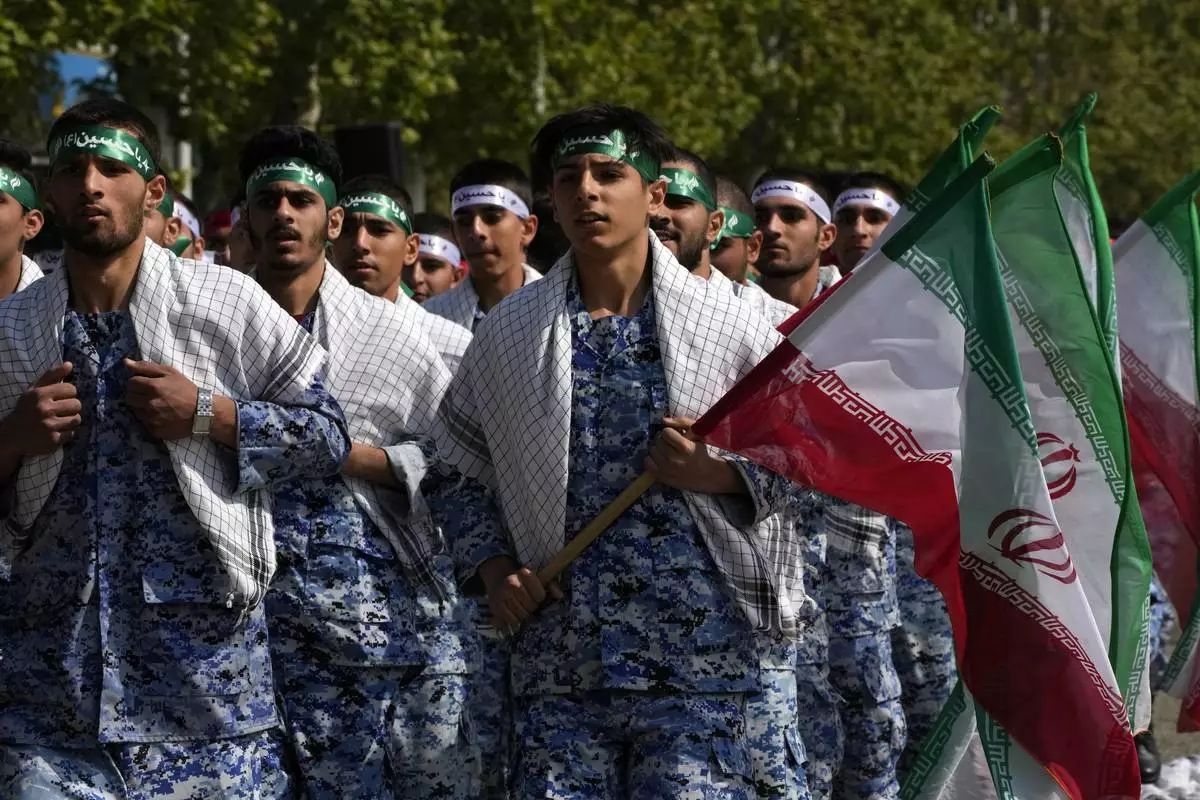
Volunteer troops of the Iranian army march during Army Day parade at a military base in northern Tehran, Iran, Wednesday, April 17, 2024. In the parade, President Ebrahim Raisi warned that the "tiniest invasion" by Israel would bring a "massive and harsh" response, as the region braces for potential Israeli retaliation after Iran's attack over the weekend. (AP Photo/Vahid Salemi)
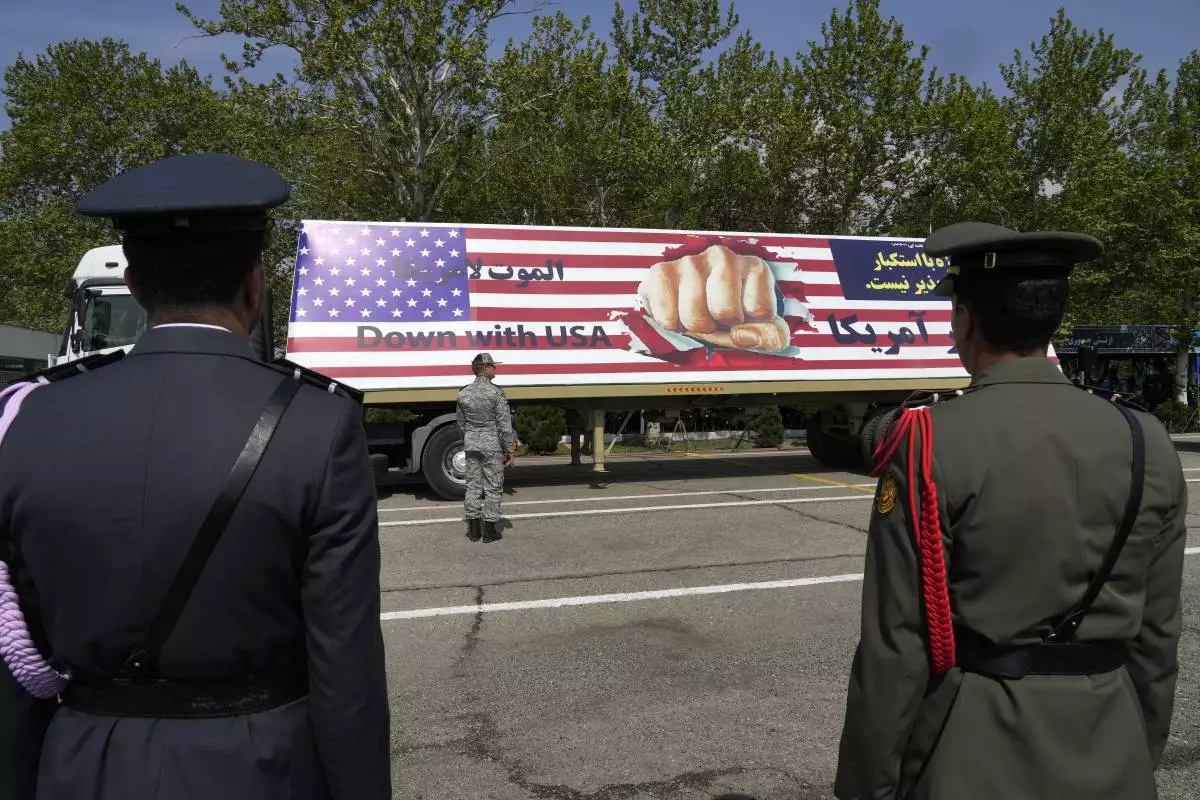
An anti-U.S. banner is carried on a truck during Army Day parade at a military base in northern Tehran, Iran, Wednesday, April 17, 2024. In the parade, President Ebrahim Raisi warned that the "tiniest invasion" by Israel would bring a "massive and harsh" response, as the region braces for potential Israeli retaliation after Iran's attack over the weekend. (AP Photo/Vahid Salemi)
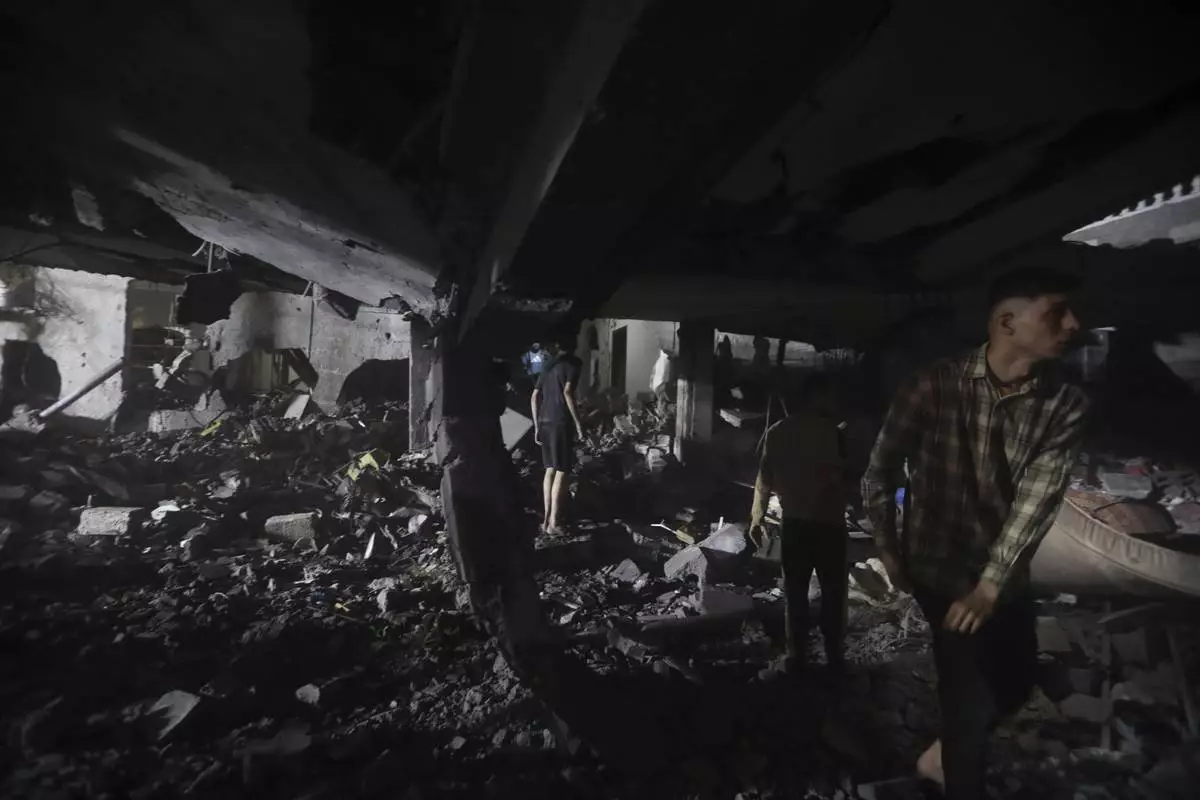
Palestinians search for survivors after an Israeli airstrike on a residential building of the abo al Hanood family in Rafah refugee camp, southern Gaza Strip, Wednesday, April 17, 2024. (AP Photo/Ismael Abu Dayyah)
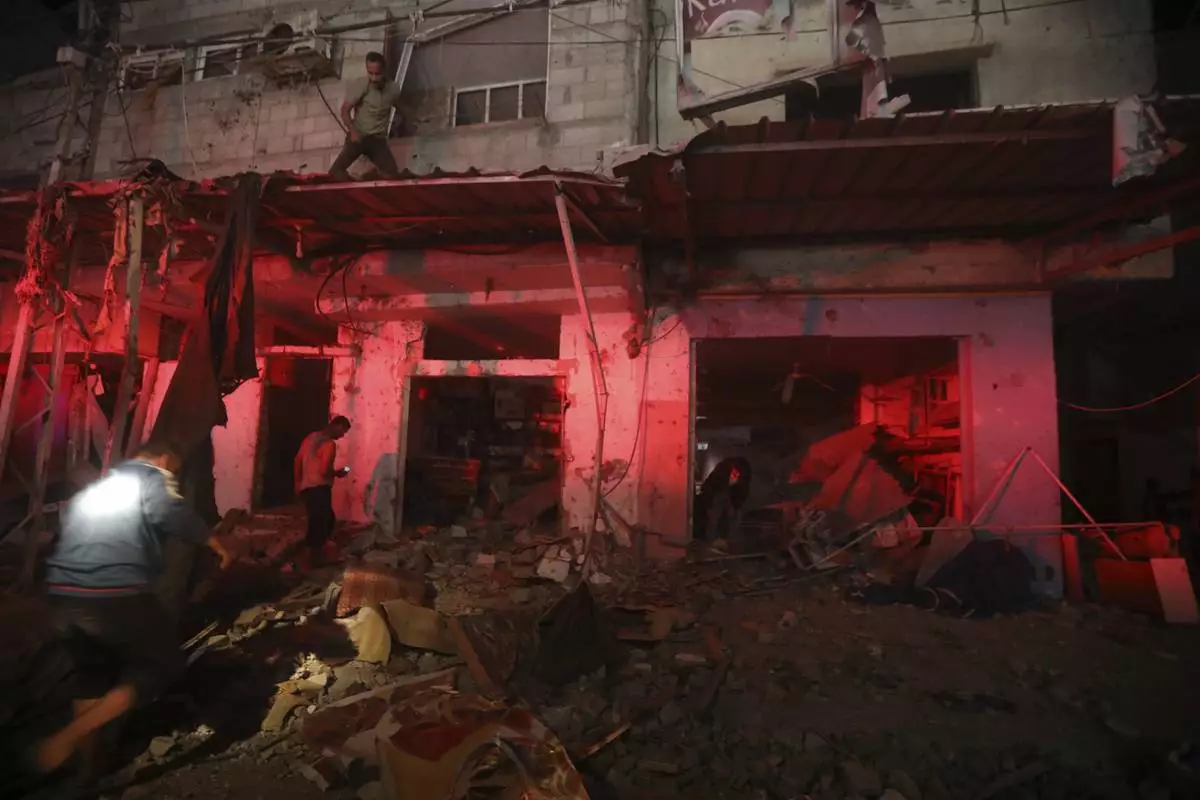
Palestinians search for survivors after an Israeli airstrike on a residential building of the abo al Hanood family in Rafah refugee camp, southern Gaza Strip, Wednesday, April 17, 2024. (AP Photo/Ismael Abu Dayyah)
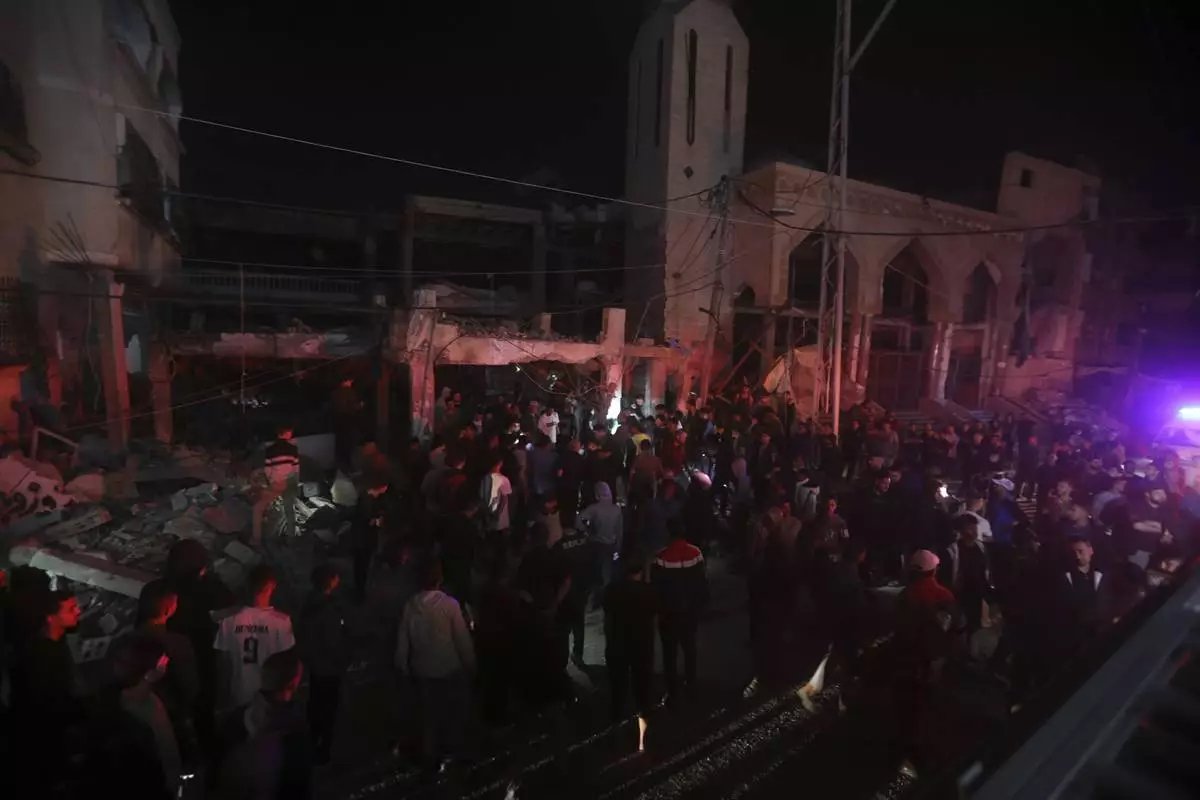
Palestinians inspect the rubble of destroyed a residential building of the Abo al Hanood family after an Israeli airstrike in Rafah refugee camp, southern Gaza Strip, Wednesday, April 17, 2024. (AP Photo/Ismael Abu Dayyah)
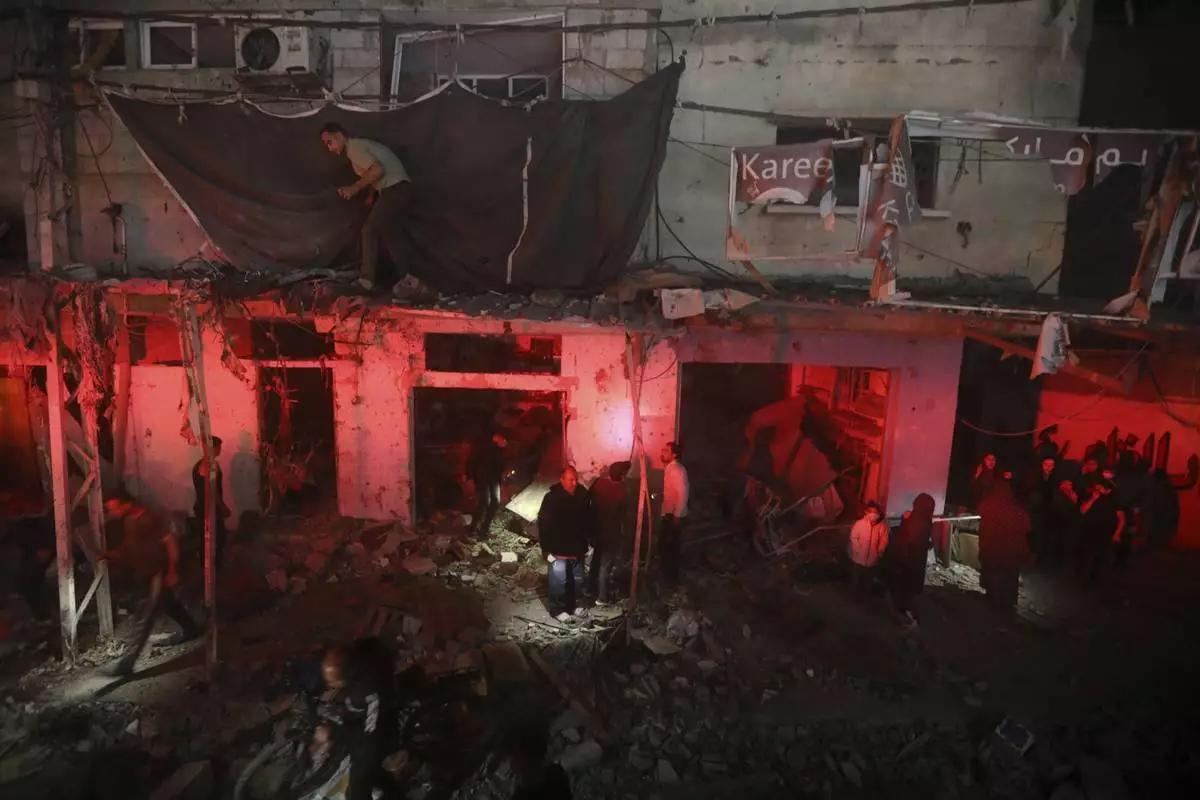
Palestinians search for survivors after an Israeli airstrike on a residential building of the abo al Hanood family after an Israeli airstrike in Rafah refugee camp, southern Gaza Strip, Wednesday, April 17, 2024. (AP Photo/Ismael Abu Dayyah)
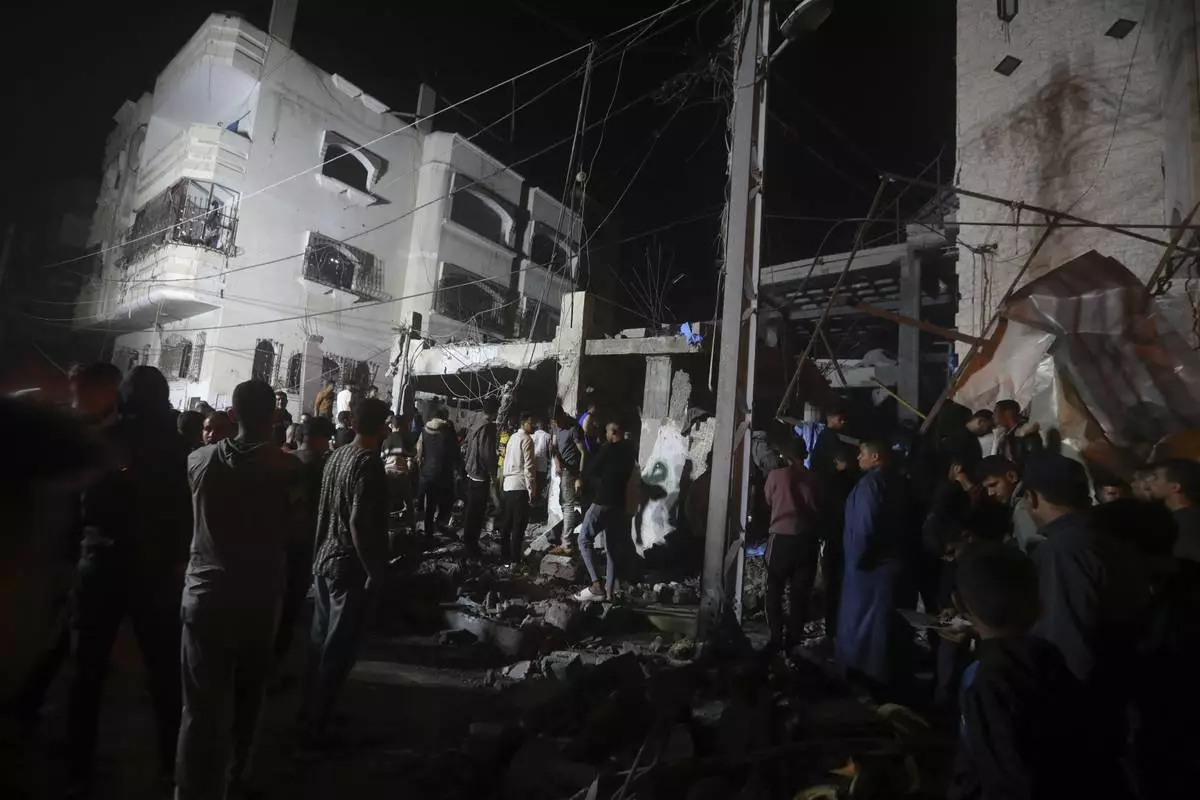
Palestinians inspect the rubble of destroyed buildings of the Abo al Hanood family after an Israeli airstrike in Rafah refugee camp, southern Gaza Strip, Wednesday, April 17, 2024. Palestinian medics said several residents, including children, were killed in the airstrike. (AP Photo/Ismael Abu Dayyah)
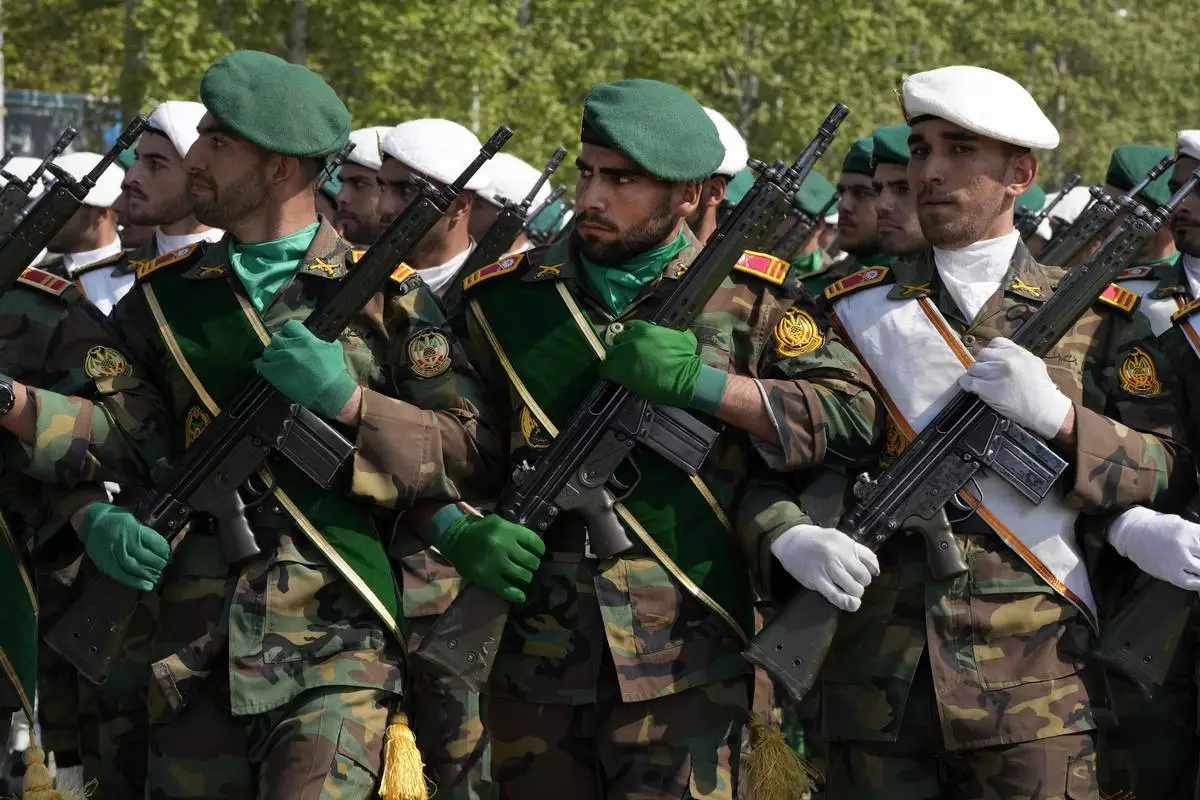
Iranian army members march during Army Day parade at a military base in northern Tehran, Iran, Wednesday, April 17, 2024. In the parade Iran's President Ebrahim Raisi warned that the "tiniest invasion" by Israel would bring a "massive and harsh" response, as the region braces for potential Israeli retaliation after Iran's attack over the weekend. (AP Photo/Vahid Salemi)
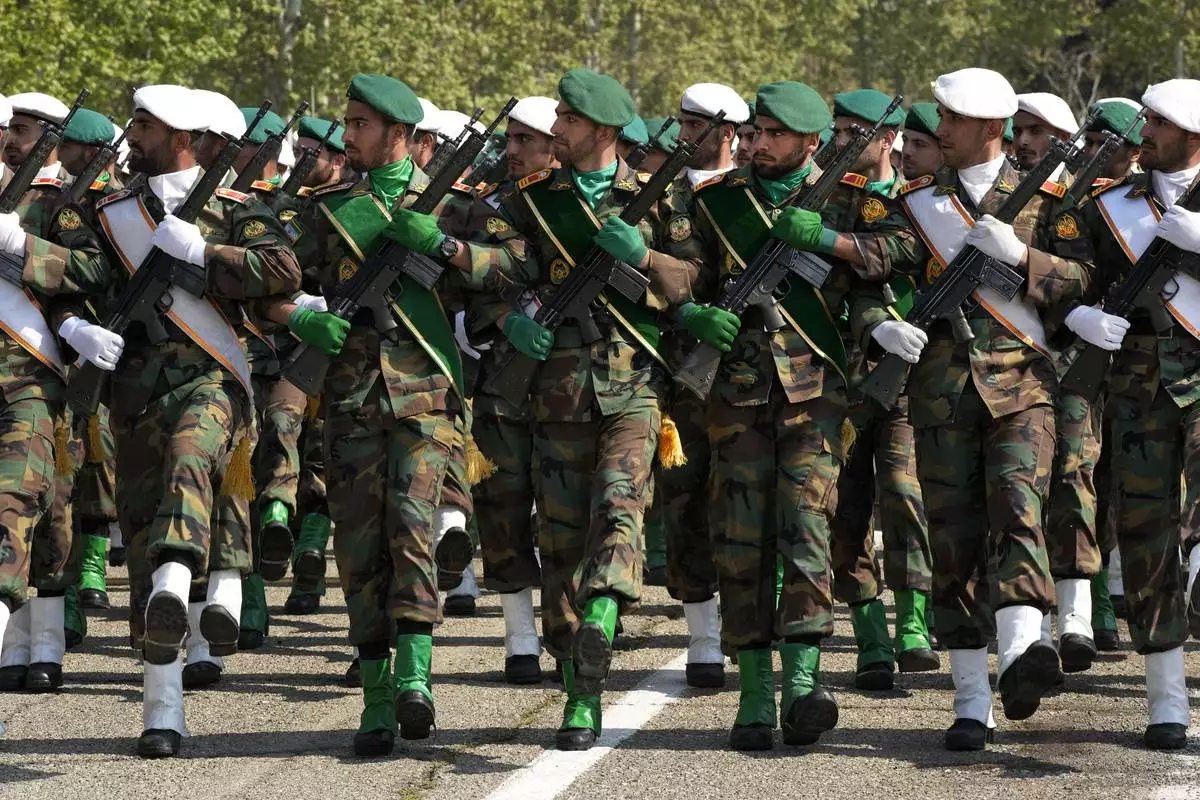
Iranian army members march during Army Day parade at a military base in northern Tehran, Iran, Wednesday, April 17, 2024. In the parade, Iranian President Ebrahim Raisi warned that the "tiniest invasion" by Israel would bring a "massive and harsh" response, as the region braces for potential Israeli retaliation after Iran's attack over the weekend. (AP Photo/Vahid Salemi)
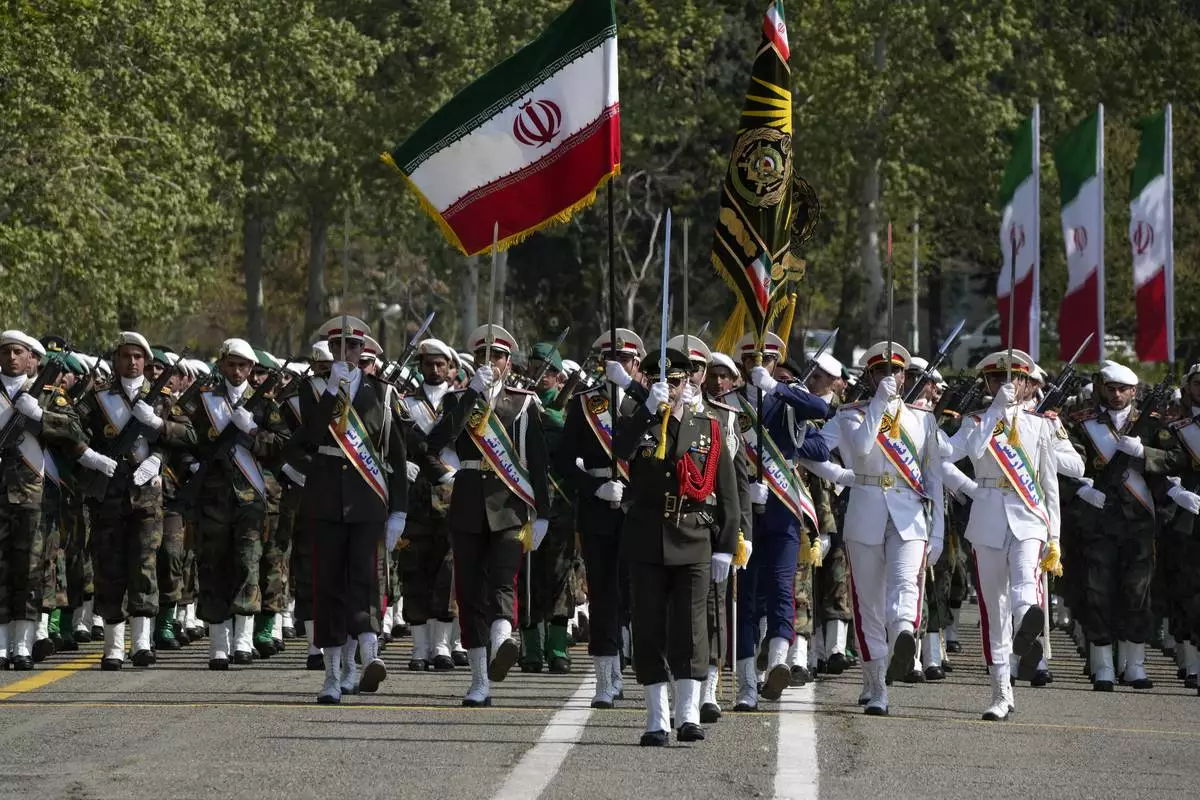
Iranian army members march during Army Day parade at a military base in northern Tehran, Iran, Wednesday, April 17, 2024. In the parade, Iranian President Ebrahim Raisi warned that the "tiniest invasion" by Israel would bring a "massive and harsh" response, as the region braces for potential Israeli retaliation after Iran's attack over the weekend. (AP Photo/Vahid Salemi)
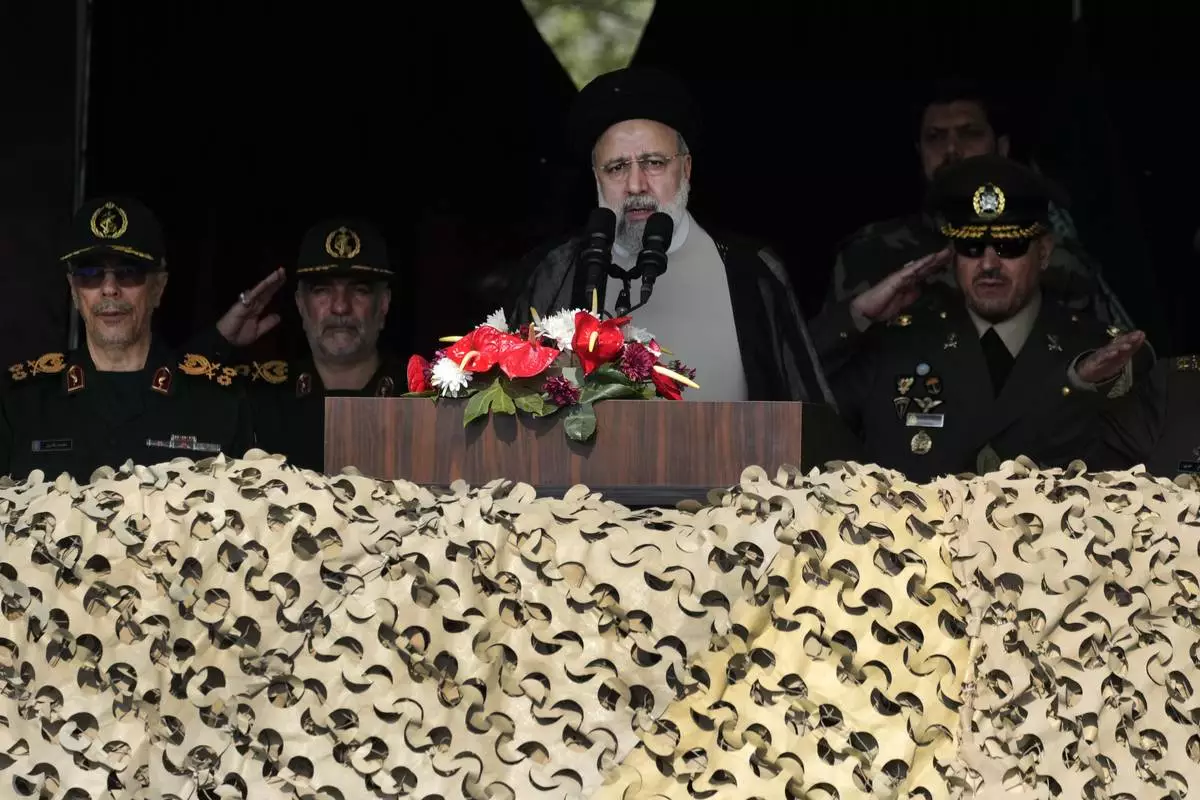
Iranian President Ebrahim Raisi speaks during Army Day parade at a military base in northern Tehran, Iran, Wednesday, April 17, 2024. Raisi warned that the "tiniest invasion" by Israel would bring a "massive and harsh" response, as the region braces for potential Israeli retaliation after Iran's attack over the weekend. (AP Photo/Vahid Salemi)



















